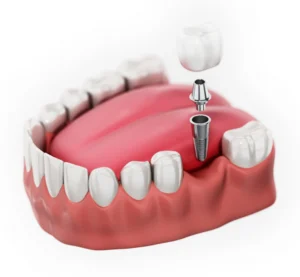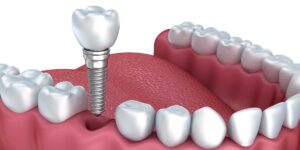Implant-supported dentures are a revolutionary dental solution that combines the stability of dental implants with the full-arch replacement of traditional dentures. This innovative approach offers patients a secure, comfortable, and natural-looking alternative to conventional removable dentures.
Key Takeaways
- Implant-supported dentures provide enhanced stability and comfort compared to traditional dentures
- They use dental implants as anchors, preventing slippage and improving chewing ability
- Two main types: removable (snap-on) and fixed (permanent)
- Suitable for patients with significant tooth loss who have adequate jaw bone density
- The procedure involves surgical placement of implants followed by attachment of custom-made dentures
- Improves oral function, appearance, and overall quality of life for many patients
- Requires proper care and regular dental check-ups for long-term success
Understanding Implant-Supported Dentures

Implant-supported dentures are a modern dental solution that addresses many of the shortcomings of traditional dentures. By using dental implants as anchors, these dentures offer improved stability, comfort, and functionality for patients missing most or all of their teeth.
What Are Implant-Supported Dentures?
Implant-supported dentures are prosthetic teeth attached to dental implants surgically placed in the jawbone. Unlike conventional dentures that rest on the gums, these dentures are secured to implants, providing a more stable and comfortable fit.
How They Differ from Traditional Dentures
Traditional dentures often come with challenges such as slipping, difficulty eating certain foods, and potential discomfort. Implant-supported dentures eliminate many of these issues by anchoring the denture securely to the jaw, allowing for improved chewing ability and speech.
Types of Implant-Supported Dentures

There are two main types of implant-supported dentures, each with its own benefits and considerations.
Removable Implant-Supported Dentures
Also known as snap-on dentures, these can be removed by the patient for cleaning. They snap onto attachments connected to the implants, providing stability while still allowing for easy removal.
Fixed Implant-Supported Dentures
These dentures are permanently attached to the implants and can only be removed by a dentist. They offer the most stable and natural-feeling solution, closely mimicking the function of natural teeth.
Candidacy for Implant-Supported Dentures
Not everyone is an ideal candidate for implant-supported dentures. Several factors determine suitability for this treatment.
Ideal Candidates
Good candidates for implant-supported dentures typically:
– Have lost most or all of their teeth
– Have sufficient bone density in the jaw to support implants
– Are in good overall health
– Do not smoke or are willing to quit
– Have healthy gums free from periodontal disease
Factors That May Affect Candidacy
Some factors that might impact candidacy include:
– Insufficient bone density (though bone grafting may be an option)
– Certain medical conditions that affect healing
– Heavy smoking
– Poor oral hygiene habits
The Implant-Supported Denture Procedure
The process of getting implant-supported dentures involves several steps and typically takes several months to complete.
Initial Consultation and Planning
The journey begins with a comprehensive dental examination, including X-rays and possibly 3D imaging. Your dentist will assess your oral health, bone density, and overall suitability for the procedure.
Implant Placement Surgery
The first surgical step involves placing the dental implants into the jawbone. This is typically done under local anesthesia, though sedation options may be available for anxious patients.
Healing and Osseointegration
After implant placement, a healing period of several months is necessary. During this time, the implants fuse with the jawbone in a process called osseointegration.
Abutment Placement
Once healing is complete, small connector pieces called abutments are attached to the implants. These will serve as the connection points for the denture.
Denture Fabrication and Fitting
Custom dentures are created based on impressions of your mouth. These are then attached to the abutments, either permanently or in a way that allows for removal.
Benefits of Implant-Supported Dentures
Implant-supported dentures offer numerous advantages over traditional dentures, significantly improving the quality of life for many patients.
Improved Stability and Function
The secure attachment to implants prevents slipping and sliding, allowing patients to eat, speak, and smile with confidence.
Enhanced Comfort
By distributing biting forces more evenly and eliminating pressure points on the gums, implant-supported dentures are often more comfortable than traditional dentures.
Preservation of Jawbone
The implants stimulate the jawbone, helping to prevent the bone loss that often occurs with traditional dentures.
Natural Appearance
Implant-supported dentures can be designed to look highly natural, improving aesthetic outcomes and boosting self-confidence.
Potential Drawbacks and Considerations
While implant-supported dentures offer many benefits, there are some potential drawbacks to consider.
Cost
Implant-supported dentures are typically more expensive than traditional dentures due to the surgical components and materials used.
Surgical Risks
As with any surgery, there are risks such as infection or implant failure, though these are relatively rare with proper care.
Time Investment
The entire process can take several months from start to finish, requiring patience and multiple dental visits.
Care and Maintenance
Proper care is essential for the longevity and success of implant-supported dentures.
Daily Cleaning
Whether removable or fixed, the dentures and surrounding gums need to be cleaned daily to prevent plaque buildup and gum disease.
Regular Dental Check-ups
Regular visits to your dentist are crucial for monitoring the health of your implants and dentures and making any necessary adjustments.
Avoiding Harmful Habits
Habits like smoking or chewing hard objects can damage your dentures or compromise the health of your implants.
Comparing Costs: Implant-Supported vs. Traditional Dentures
While the initial cost of implant-supported dentures is higher, they may prove more cost-effective in the long run.
| Factor | Implant-Supported Dentures | Traditional Dentures |
|---|---|---|
| Initial Cost | Higher | Lower |
| Longevity | 10-15 years or more | 5-7 years on average |
| Replacement Frequency | Less frequent | More frequent |
| Additional Procedures | May require bone grafting | May require frequent adjustments |
| Long-term Cost | Can be lower due to longevity | Can be higher due to replacements and adjustments |
Success Rates and Patient Satisfaction
Implant-supported dentures generally have high success rates and patient satisfaction levels.
| Aspect | Success Rate/Satisfaction Level |
|---|---|
| Implant Success Rate | 95-98% over 10 years |
| Patient Satisfaction with Function | 90-95% |
| Patient Satisfaction with Appearance | 85-90% |
| Overall Quality of Life Improvement | Reported by 80-85% of patients |
Alternatives to Implant-Supported Dentures
While implant-supported dentures offer many benefits, they’re not the only option for tooth replacement. Some alternatives include:
- Traditional removable dentures
- Dental bridges (for partial tooth loss)
- Individual dental implants (for replacing single or multiple teeth)
- All-on-4 dental implants (a variation of implant-supported dentures)
Technological Advancements in Implant Dentistry
The field of implant dentistry continues to evolve, with new technologies improving outcomes and patient experiences.
3D Imaging and Planning
Advanced 3D imaging techniques allow for more precise implant placement and treatment planning.
Computer-Guided Surgery
Computer-guided implant placement can increase accuracy and reduce surgical time.
Improved Materials
New materials for both implants and dentures are continually being developed, offering better durability and more natural aesthetics.
Making the Decision: Is It Right for You?
Deciding whether implant-supported dentures are the right choice requires careful consideration of various factors.
Consulting with a Dental Professional
A thorough consultation with an experienced dentist is crucial for understanding your options and determining the best course of treatment.
Weighing Pros and Cons
Consider the benefits and potential drawbacks in light of your personal health, lifestyle, and financial situation.
Long-Term Outlook
Think about the long-term impact on your oral health, quality of life, and potential future dental needs.
Preparing for the Procedure
If you decide to proceed with implant-supported dentures, proper preparation can help ensure a smooth process and optimal outcomes.
Pre-Operative Instructions
Your dentist will provide specific instructions to follow before the implant surgery, which may include dietary restrictions and medication adjustments.
Arranging Post-Operative Care
Plan for someone to drive you home after the procedure and assist you during the initial recovery period.
Setting Realistic Expectations
Understanding the timeline and potential challenges of the process can help you mentally prepare for the journey ahead.
Recovery and Adaptation
The recovery process after implant surgery and the adaptation to new dentures are important phases of the treatment.
Immediate Post-Operative Care
Following your dentist’s instructions for pain management, oral hygiene, and diet is crucial in the days following implant surgery.
Adjusting to Your New Dentures
There may be a period of adjustment as you get used to speaking and eating with your new implant-supported dentures.
Long-Term Oral Health Maintenance
Developing good oral hygiene habits and attending regular dental check-ups are essential for the long-term success of your implant-supported dentures.
In conclusion, implant-supported dentures represent a significant advancement in dental prosthetics, offering a more stable, comfortable, and functional solution for those missing most or all of their teeth. While they require a greater initial investment of time and money compared to traditional dentures, the long-term benefits in terms of oral health, functionality, and quality of life make them an attractive option for many patients.
As with any major dental procedure, the decision to get implant-supported dentures should be made in consultation with a qualified dental professional, taking into account your individual needs, health status, and goals for your smile. For more information, you can visit our website or contact us.
